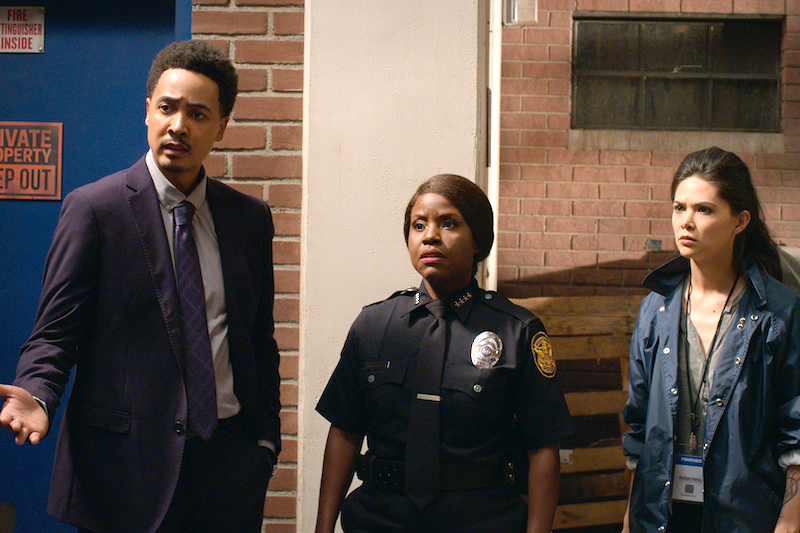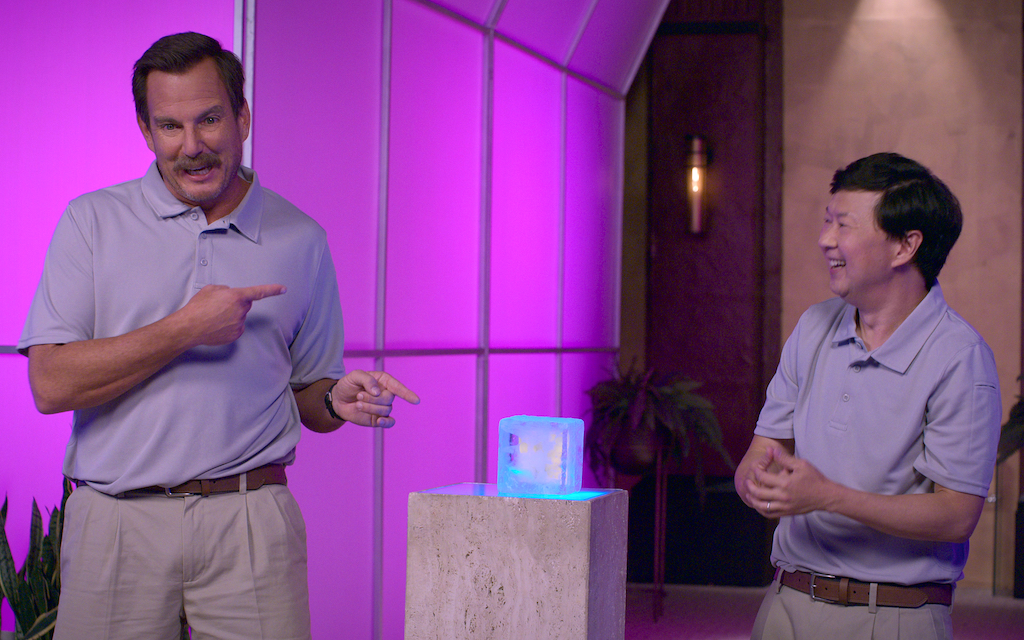A murder case each week. A hapless detective who sleeps in his office. An uninformed celebrity guest detective who must name the killer in thirty minutes. These are the basic ingredients for Murderville – a semi-scripted comedy show. Based on the BBC3 series Murder In Successville, creator Krister Johnson (Children’s Hospital, Medical Police) reworked the idea for American audiences into Murderville.
“The format of Murderville is in the structure of a traditional hour-long police procedural,” said Johnson. These include introducing the characters at the police station, a murder, a crime scene investigation, gathering evidence, and the eventual solving of the crime.
Murderville shines in that there is a celebrity guest each week without a copy of the script or background knowledge, so they must solve the case on the fly. “The world is thrown into chaos because they improvise.” Johnson’s world is similarly upheaved because “although we know where the story is going to go, we don’t know how we’re going to get there.” Senior Detective Terry Seattle (Will Arnett) is “the ringleader of the circus. Each week a new detective has to work with him [because no-one stays] and also, overcome him.” The guest detectives, including Sharon Stone, Ken Jeong, Annie Murphy, and Conan O’Brien, are in most scenes, so there are many unknown factors in the show that can’t be addressed on the page.

Krister Johnson
The challenge for Krister and his writing team is to balance the guests with the suspects, who work off a script. “We have to get the suspects to fit into the story structure and provide subtle clues to solve the murder.” Terry Seattle had to interface between the two camps by providing character insights and gags along the way that fit the pre-defined elements of the story and guide the guests toward the answer. The goal was to make the show feel real and authentic rather than staged. On the other hand, Murderville also wanted to avoid the overly-polished feel of highly-edited crime television shows. “How loose do we make it so people feel those authentic moments?” postulated Johnson.
Seattle is having great difficulty coping with his ex-wife Chief Rhonda Jenkins-Seattle (Haneefah Wood) who happens to be dating their co-worker Detective Dad Phillips (Philip Smithey). In one episode, he makes Sharon Stone promise not to fall in love with him to make their partnership work.
Trans Atlantic Adaptation
“We kept a lot of what the original series did,” continued Johnson. He described the tone of the original series as being more noir than Murderville. “We also leaned more into traditional American tropes of the hard-bitten, lone wolf detective who can’t keep a work or romantic partner.” Krister retained the general structure of the original – three suspects, some clues, some red herrings, and the eventual naming of the killer.
The major change was doing away with the town called Successville in the original which was entirely populated by celebrities. Every suspect and witness was played by a celebrity. “For instance, Taylor Swift appears on an episode, but plays a medical examiner rather than herself.” Krister Johnson felt this dynamic might be too much for American sensibilities.
Krister also felt that limiting these guest celebrities gave Murderville more space to mine Will Arnett’s character Terry Seattle. He also wanted there to be a core set of characters to anchor the show with a guest trainee detective each week.
There isn’t much serialization in Murderville except for Terry Seattle grieving his failed marriage and tracking finding the murderer who killed his original work partner.

Daz Phillips (Philip Smithey), Rhonda Jenkins-Seattle (Haneefah Wood) & Amber Kang (Lilan Bowden). Photo courtesy of Netflix
Although Johnson didn’t explicitly source various crime shows for plot lines, there are a few notable exceptions. “In some ways there’s a Law and Order tone to the show, particularly Detective Seattle’s who takes himself very seriously, as ridiculous as he is. There’s an air of gravitas to what he’s doing.” Apart from these similarities, Murderville is a comedy and a crime show in name only. “It’s a cop show without any real cop action,” joked Krister. Despite the absurdity of Murderville, the characters still had to feel uncomfortable and struggle to solve the case.
Murderville carefully balances its scripted and improvised elements. “At times it became a bit of a prank and sketch show. It’s also a bit of a game show because you need to come up with an answer at the end.” The aim of some plot points was simply to throw the guests off balance. There is a limit to how much discomfort the guests can take. If it’s too much, it can derail the narrative flow of the show.
The crimes were all constructed in the writers’ room. Johnson looked to “fun crimes” for his show. “I didn’t want them to be too outlandish or goofy, but I did want them to feel heightened. I didn’t want Murderville to feel evocative of real life,” he said. An example of this was a woman accidentally sawn in half during a magic show. Once they decided on the crime of the day, Johnson and his team looked for equally fun suspects to add to each episode. He cites an example from an episode where a diner was poisoned by their soup. Krister looked at what kind of suspects they might have the most fun with such as a health inspector.
Like many comedy writers, Krister Johnson has difficulty in defining exactly what makes good comedy. “In the case of Murderville, it was a case of stupid people thinking they’re smart. This is especially true of Will’s character who doesn’t have a lot of self-perspective, but for some reason has a lot of confidence in himself. This is both good comedy and entertaining.”
Terry Seattle has no idea of how ridiculous he is
In site of his sometimes utter lack of self-awareness, there’s a small part of Terry Seattle that is aware. He winks at his own silliness, but finally redeems his career at the end of the season. “Terry’s a great tragi-comic character.” Krister Johnson grappled with these dramatic components for a long time. “There were times when Terry’s burden felt too real as he dealt with the pain of the moment.”
In conclusion, Johnson has some advice for comedy writers. “Have some self-awareness and watch how industry people react to your work.” The business is extraordinarily difficult so comedy writers need to figure out whether they have a knack for comedy and really enjoy writing it.
